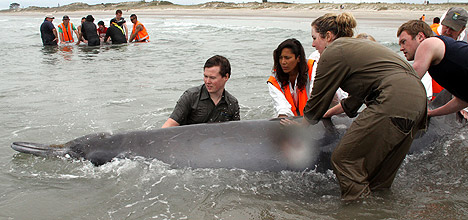The exact cause of the death of four Gray's Beaked whales at Papamoa Beach remains unknown.
Department of Conservation staff are collecting samples to investigate whether the ingestion of oil, toxins and foreign objects from the Rena wreck at Astrolabe Reef could have been a factor in the whale stranding and subsequent death.
The four whales, two lactating females and two young juveniles, were found dead at the eastern end of Papamoa Beach on Saturday, January 21.
Volunteers refloat a whale that beached itself on Papamoa Beach in November last year.
DOC spokesperson Katrina Knill says the cause of the stranding is not yet known, however it appears one of the juveniles stranded first, leading to the subsequent stranding of the others as they stayed nearby.
Katrina says no evidence has been found at this stage to suggest the stranding is related to the Rena, which grounded on Astrolabe Reef about 25kilometres off the coast of Tauranga on October 5.
On January 8 a storm broke the ship apart sending more than 150 containers into the water, scattering the beaches with debris and sending more oil into the water.
On January 13 Maritime New Zealand confirmed fresh patches of oil had been found on the Papamoa beach east towards Maketu.
The amount of fresh oil leaked is unknown, although it is thought to be tens of tonnes, as opposed to the estimated 350 tonnes that washed ashore on beaches following a storm on October 11.
Owner of Butler's Swim with Dolphins Graeme Butler believes the stranding of the whales is somehow linked to the Rena incident.
'This is very worrying, when you see a spike in the number of strandings, the only changing factor seems to be the Rena. There have been quite a lot of whale strandings since the Rena incident.
'I don't know what the toxicity of the water is around Astrolabe Reef, it doesn't surprise me, if animals are creatures of habit, they are not going to venture far and so they could be in danger of affected by the toxicity.”
Graeme frequently sees Gray's Beaked whales in the ocean off the coast of Tauranga, typically in areas south of Mayor Island and north of Astrolabe Reef.
'When you see this number of fatalities it becomes very concerning.
'I can't give a scientific judgement, but as an observer of wildlife I think the resident population of whales has been compromised by the Rena.”
He says there is a resident Gray's Beaked whale population in the Bay of Plenty, although being shy creatures not as much is known about this breed of whale compared to the more frequently seen Orca.
'At sea the most you normally see of Gray's Beaked is the dorsal fin, you don't puff out like other whales. When you see these whales are not very interesting to look at, but they are out there.”
Graeme says the sonar device used to search the seabed for containers fallen from the Rena could also be interfering with whales.
'The last sonar search coincided with a spate of whale strandings, and now again after the break-up of the ship they started using the sonar to search for containers and this has happened.”
Plans were underway to bury the bodies of the four whales by DOC staff and iwi representitives on Saturday afternoon.
DOC encourages any members of the public to alert DOC of any whale strandings as soon as possible by calling 0800 DOC HOT (0800 362 468), so that the necessary care be arranged for the whales and their chance of rescue increased.



0 comments
Leave a Comment
You must be logged in to make a comment.